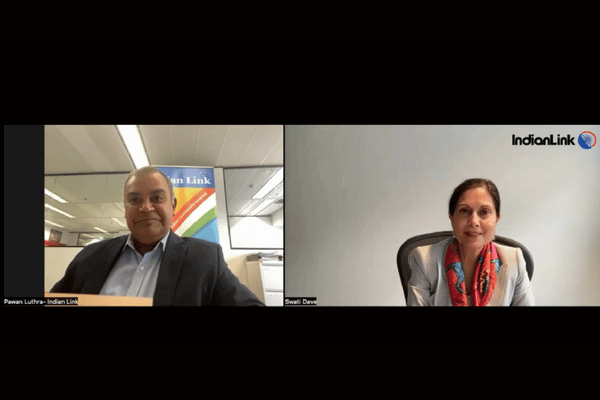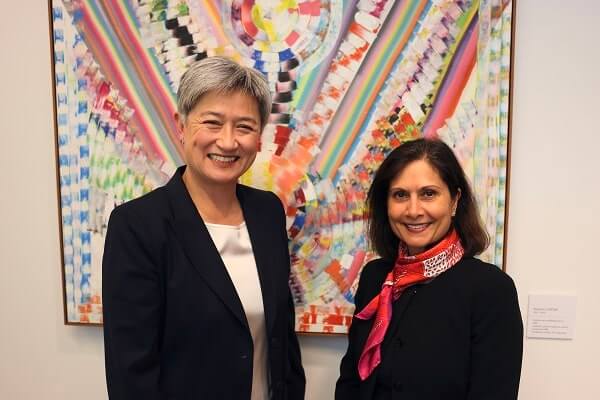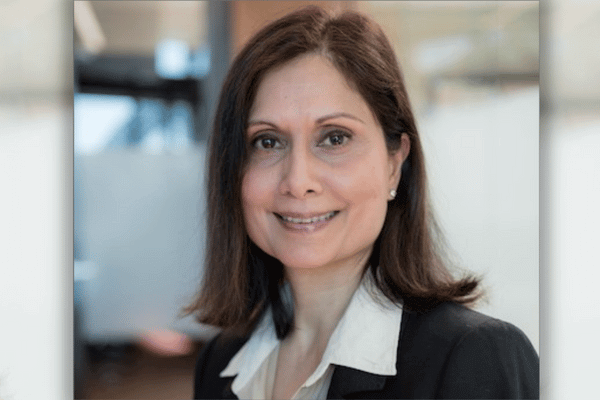Pawan Luthra: That the Australian Government is very keen to stop stronger ties with India was evident when they allocated $21.4 million in the last budget towards establishing a Centre for Australia-India Relations, or CAIR, a national platform bringing together all levels of government, industry and the broader community.
Earlier this week, Foreign Minister Penny Wong announced high profile corporate executive Swati Dave as Chair of this new centre. Welcome Swati. And thank you for joining us on Indian Link.
Swati Dave: Thank you, Pawan. Lovely to be here.
Pawan: Now, when making the announcement, Foreign Minister Penny Wong said the role will – and I quote – “serve as a national platform to strengthen our relationship with India”. Swati, right into the driver’s seat, any pressure?
Swati: Well, you know, we thrive on pressure. I think if there is high expectation, then there’s also the incentive and the motivation to actually deliver. If I can say, Pawan, I’m incredibly honoured to be appointed as the inaugural Chair of the centre. It’s a wonderful time to be doing this, because it comes off the back of an incredibly strong bilateral relationship. I want to position the centre to build upon that really positive momentum. So yes, there’s pressure. But, I think, the things we want to do are going to be practical, and hopefully will deliver some important outcomes for our country.
Pawan: We’re looking forward to that. Let me dig into this a bit deeper. The three pillars for the centre are greater engagement at government levels, at industry levels, and the broader community. On the government level, where do you currently see this relationship?
Swati: There is quite a lot of government engagement already. The Quad is progressing very strongly. We have ECTA, which has also created a platform for more to happen between the countries. And if I reflect on the last year, there have been many ministerial visits from India. So we’re actually seeing greater engagement very visibly. And that is set to continue over the next little while. So again, it’s a really good backdrop. And that engagement will continue at many levels.

Pawan: Swati, you’ve had extensive corporate experience – Westpac for 13 years, MP, Deutsche Bank, NAB for 10 years. Now, with that as a background, for your current role as chair of CAIR, what are your thoughts about the engagement of industry?
Swati: I feel that given the developments in India, certainly over the last short period, there’s a contemporary India that we need to make more visible and more accessible for corporate Australia. So there’s a great role for the centre to help that business literacy. It is about making people aware of how India has changed, how open it is now, and where the opportunities are. So, (moving on from the past), I think we have to think about what is possible in the future and how the centre can facilitate that level of understanding.
Pawan: And how do you think the centre can facilitate that level of understanding?
Swati: Some of the priorities for us will be around uplifting that business literacy. And (that could mean) demystifying India for Australia and Australians, making people more aware of what contemporary India looks like, where they’re focusing their attention, where the two countries have synergies and can work together
effectively. So (we’ll be) spending some time and effort on uplifting that. And we’ll do that with people that are already busy in the market doing that. The diaspora is doing that, whether informally or formally; the various associations and organisations have been doing that for a long time. So this is really to build upon what they’re doing. You know, it’s very important that we’re not seeking to replace or displace what’s going on; we will provide a national platform to make sure all those discussions are elevated and given a lot more urgency and momentum.
Pawan: The goal is to increase bilateral trade from $27 billion to about $45-50 billion in the next five years. A daunting task?
Swati: It is a daunting task, but you have to match it up against the opportunities that present. India is a very large market, and is becoming a more important market for Australia and for the region and indeed the world. So it will still be a drop in the ocean in terms of the potential opportunities. We need to work out what opportunities are appropriate for our businesses to engage in, and how do we help them get comfortable with those opportunities. At the end of the day, all businesses need to make decisions based on their own strategy, their own risk appetite for different markets, but I’m very hopeful that they do consider India as a very important market for them to engage with.
Pawan: Swati, the Peter Varghese report, An India Economic Strategy to 2035, emphasises the importance of the role of the diaspora. Community engagement is the third pillar of CAIR. You grew up in a Gujarati family in Newcastle and married into a Gujarati family, you have three young boys, and you interact regularly with the broader Indian community here. What has changed in the diaspora as to how they view the bilateral relationship? And how can this momentum be harnessed?

Swati: When I came here in 1971, it was a very different Australia, with very few diaspora. But the community has grown to an amazing level. We are seeing a much more diverse range of skills and aspirations and ambitions from the community. I am seeing a lot of vitality and energy and confidence. A can-do attitude is coming through very strongly. And I think that is really important if we’re going to take the relationship forward.
Pawan: How do you harness this energy?
Swati: We just need to let them do more of what they have been doing so well for the past few decades. And I think with the centre, engaging more with them, really listening to them, we can actually add value to them, and help them achieve those aspirations.
Pawan: Swati, I’m aware it’s less than 48 hours since this announcement was made. It’s early days yet, but any milestones to achieve in the first 100 days as chair?
Swati: Well, for me, it’s to actually have a CEO and advisory board appointed because then we can actually (formulate) a strategy and start progressing. But having said that, we’re not waiting, because this is important work. We want to create momentum, and we want to deliver outcomes. What my business background has certainly taught me is you have to deliver results. That’s what people are looking for, and I’m very clear that that’s what’s expected of me.
Pawan: Any message to the wider Indian Australian community from this platform?
Swati: Firstly, a huge thanks from me for what you have created because it is something quite magnificent. Secondly, a huge thanks for all the wonderful messages that I’ve received in the last 48 hours. I’ve spent a very busy couple of days in Canberra, so it took me a while to get back and actually see what’s going on. But thank you all very much and I really look forward to working with you. Please reach out to me if there’s anything you think is critically important for me to be aware of or to focus on, because a lot of this stuff comes from people who are living and breathing these relationships on a day-to-day basis. So reach out and let me know what you’re thinking.
Pawan: Swati Dave, inaugural Chair of the Centre for Australia-India Relations, congratulations on your new appointment and sincere best wishes.
Swati: Thank you, Pawan.
Read More: Swati Dave to lead the new Centre for Australia-India Relations as Chair





